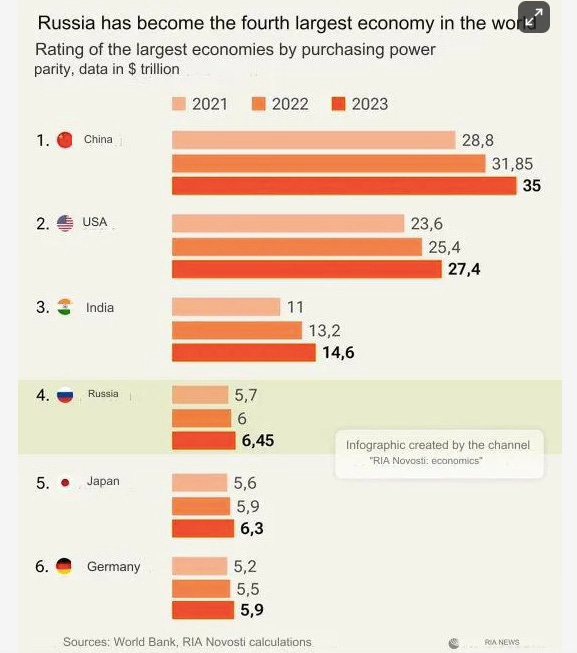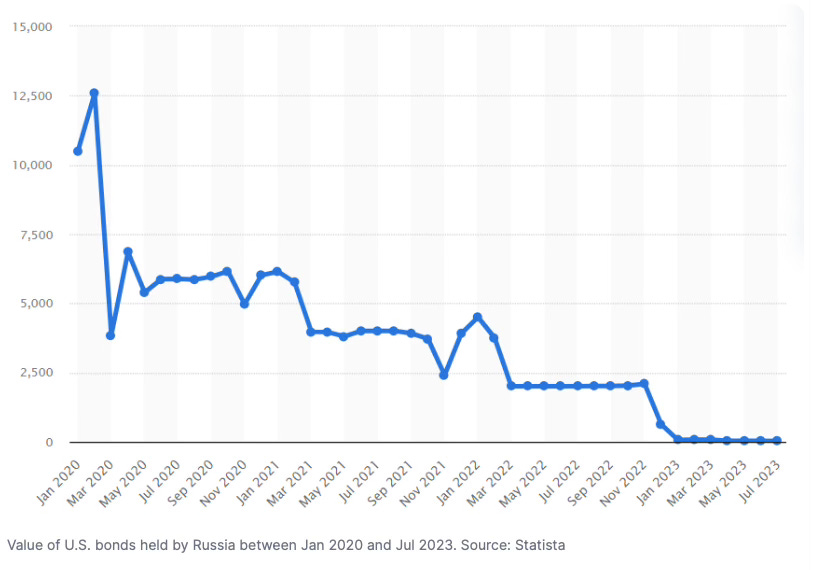Republished in the journal, New Cold War, June 14th, 2024.
Russia, a BRICS member, officially became the 4th largest economy, overtaking Japan, according to the World Bank. The figures are based on Purchasing Power Parity (PPP), a standardised method to assess the relative buying power of different economies, rather than the less accurate exchange rate comparisons, which tend to inflate the economic size of high income countries. PPPs adjust for price level differences across economies allowing comparison of key measures such as GDP and material wellbeing.
China’s GDP came in at $29 trillion in PPP terms in 2021 or 18.9% of global GDP, followed by the US - $24 trillion (15.5%), India - $11 trillion (7.2%), Russia - $5.7 trillion (3.8%), Japan - $5.6 trillion (3.7%), Germany - $5.2 trillion (3.4%), Brazil - $3.7 trillion (2.4%) and France - $3.6 trillion (2.4%). The UK was ranked the 9thlargest economy - $3.5 trillion (2.3%).
Some analysts have argued that Russia’s economy is significantly underachieving because it is one of the most sanctioned and economically undermined nations on earth. So, it’s remarkable that even with these externally imposed handicaps, the IMF predicts Russia will grow faster than all advanced economies. Western sanctions have actually backfired in that Russia has become more self-sufficient and less dependent on imports. It also has low debt levels and high reserves.
The US economy, on the other hand, isn’t looking so good. Since July 2018, the US has created no new jobs for native-born Americans. In the past year most new jobs, mainly low paid and part-time, have gone to immigrants. In May alone, 414,000 immigrants gained a job while 663,000 native-born Americans lost their job.
When asked why economists believe the US economy is growing when Americans believe otherwise, former NY Times journalist Chris Hedges replied:
“Because the economy is declining. The figures are completely fixed, whether it’s unemployment, so after six weeks if you’re considered not looking for work, you’re erased from the polls…. If you work one hour a week, you’re considered employed. The gig economy doesn’t provide sustainable income and then of course you can lose your job instantly… so much of our economic health is tied to wherever the stock market is, which is utterly irrelevant to most working men and women.”
The UK is doing no better. During April, growth flatlined at 0%, unemployment is rising and long-term sickness is at a record high. Public services are crumbling, inequality is soaring, productive investment is falling and Starmer’s English Labour has signalled it will double down on Tory austerity.
Meanwhile, dedollarisation, moving away from the US dollar as the world’s international reserve currency, is accelerating. In the last 2 years, Russia dumped $4.5 billion in US bonds and China has offloaded $22 billion of US bonds in the first quarter of this year.
These countries are also buying increasing amounts of gold. In January, the central banks of China, Turkey, Kazakhstan, Jordan, Czech Republic, Russia and India added 39 tonnes to their global gold reserves.
This fits with the BRICS nations’ goal to move away from the dollar. LSE Professor Robert Wade said that the US, by weaponising the dollar and dollar payments system against countries such as Russia, China, Iran, Cuba, Venezuela, Afghanistan and North Korea, has incentivised them to escape dollar dominance and create a new international financial system, one not controlled by a single country.
At the recent St Petersburg International Economic Forum (SPIEF) held on 5-8 June which was attended by 17,000 participants from 130 countries, the BRICS development bank president, former Brazilian president Dilma Rousseff, said that the strategy was to create a decentralised financial system organised around regional centres, away from a unipolar to a multipolar global economy, that will be more resilient to global shocks and crises and will shield smaller economies in the global south from western sanctions and economic bullying. The BRICS bank will facilitate settlements in national currencies which is important for countries that don’t have strong currencies and are vulnerable to exchange rate volatility.
BRICS currently has ten members representing 31.5% of global GDP vs 30.7% for the G7 countries, and is set for a massive expansion with 42 countries expressing an interest in joining.
The BRICS model appeals to countries because it offers an alternative to the current US-dominated global order. It isn’t controlled by a single nation, it encompasses most of the global population, it doesn’t rely on wars, violent coups and economic sanctions but on economic development, mutual respect and trade, and it’s voluntary, not coercive.
As the US unipolar order wanes and a new multipolar one rises to replace it, the world faces growing instability and danger, mainly from the US ruling class and the transnational corporate interests that have captured it, because they realise their dominance is coming to an end.
Ironically, the US appears to be doing all that it can to hasten its decline. It’s fighting a proxy war with Russia in Ukraine that’s turning into a real war between the world’s two major nuclear powers, it’s funding Israel’s genocide and may start a war with Iran, and it’s stoking a war with China over Taiwan. Like a wounded and cornered beast, the US is lashing out with its only remaining power - its military.
If a cataclysmic war, which would render all talk of new world orders irrelevant, can be avoided, then there’s a good chance this small planet can become fairer, more peaceful and stable for all its inhabitants.










If only we had a central bank and a currency eh? We could be part of the real world. USA won't be happy.